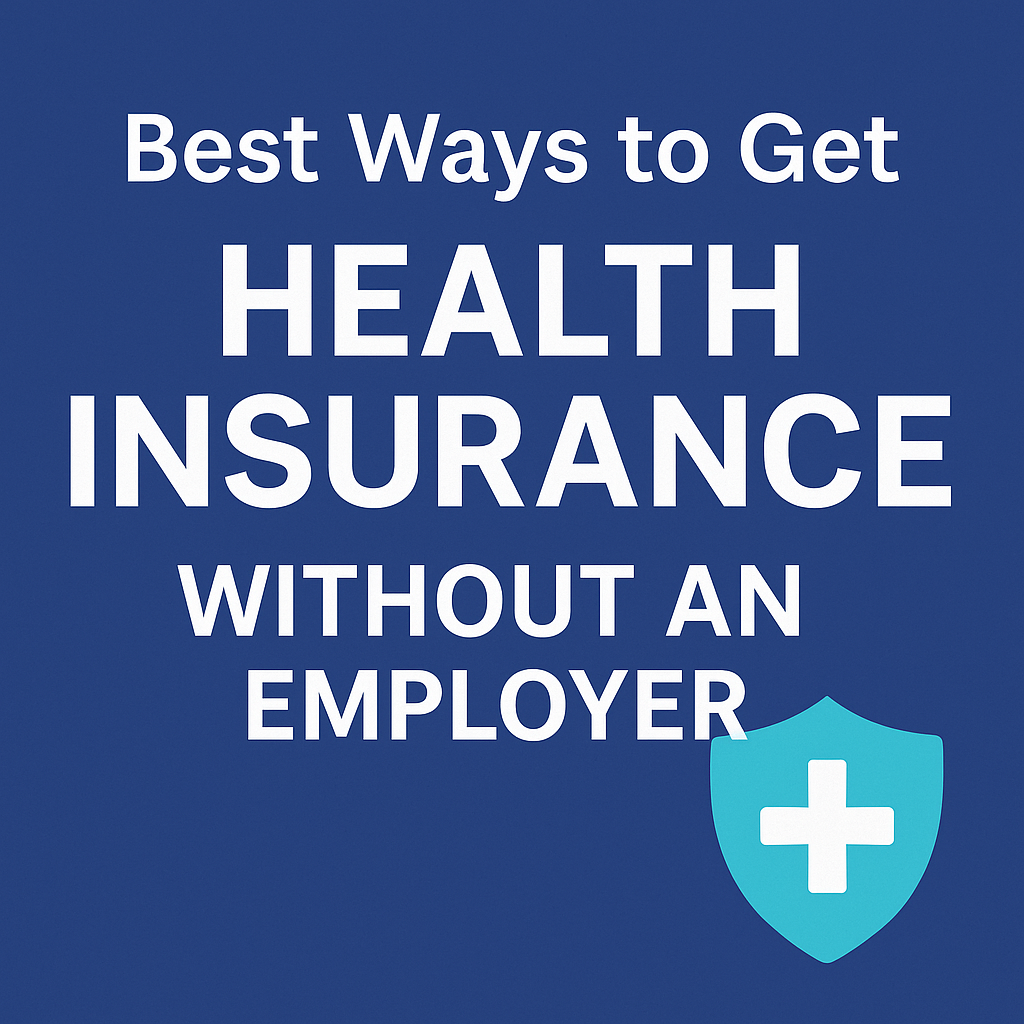Best Ways to Get Health Insurance Without an Employer

Not everyone has the benefit of getting health insurance through a job. Whether you're self-employed, between jobs, or working part-time, finding health insurance without employer coverage may feel overwhelming — but you do have options.
The good news is that there are several reliable ways to get health coverage on your own. Understanding those options can help you make the right choice without overspending or settling for a plan that doesn't fit your needs.
- 💡 Who Needs Health Insurance Without an Employer?
- 🛠️ Option 1: Use the Health Insurance Marketplace
- 📄 Option 2: Explore Private Insurance Plans
- 🧾 Option 3: Look Into Medicaid (If Eligible)
- 👪 Option 4: Join a Family Member’s Plan
- 🔄 Option 5: COBRA Coverage (Temporary Extension)
- 🌐 Option 6: Join a Professional or Trade Association
- 🔍 How to Choose the Right Plan for You
- 🙋 Common Questions About Health Insurance Without Employer Coverage
💡 Who Needs Health Insurance Without an Employer?
If you fall into one of the following groups, this guide is for you:
- Freelancers and independent contractors
- Gig workers (Uber, DoorDash, etc.)
- Part-time workers without benefits
- People who recently left a job
- Students, early retirees, or those between life transitions
Whatever your situation, you don’t need an employer to get quality health coverage — you just need to know where to look.
🛠️ Option 1: Use the Health Insurance Marketplace
The federal or state-run marketplace (like Healthcare.gov in the U.S.) is a common starting point for people without employer coverage. These marketplaces let you compare multiple health insurance plans side by side.
Key benefits:
- You may qualify for income-based subsidies
- Guaranteed acceptance (no rejections for pre-existing conditions)
- Wide range of plan types: Bronze, Silver, Gold, and Platinum
Plans on the marketplace are required to cover essential benefits like hospitalization, preventive care, mental health, and prescriptions.
📄 Option 2: Explore Private Insurance Plans
If you don’t qualify for subsidies or want more flexibility, private insurers offer a variety of plans outside the marketplace.
Where to find them:
- Directly on insurance company websites (e.g., Cigna, Oscar, BlueCross)
- Through licensed insurance brokers
- On comparison sites like Policygenius or HealthMarkets
What to watch for:
- Premiums may be higher without subsidies
- Some plans offer better provider networks or extra benefits
- Always read the fine print on deductibles and out-of-pocket costs
🧾 Option 3: Look Into Medicaid (If Eligible)
Medicaid is a government program that provides free or low-cost health insurance to people with limited income.
Even if you don’t think you qualify, it’s worth checking — income thresholds vary by state, and many states have expanded coverage in recent years.
Apply directly through your state’s Medicaid office or at Healthcare.gov
👪 Option 4: Join a Family Member’s Plan
If you're under 26, you can still be on your parent’s health plan. If you're married, your spouse’s employer plan might allow you to be added as a dependent.
This is one of the most affordable and straightforward options — just make sure to compare premiums and benefits.
🔄 Option 5: COBRA Coverage (Temporary Extension)
If you recently left a job with health benefits, you may be eligible for COBRA. This lets you continue your previous employer’s health plan, but you’ll have to pay the full premium (including what your employer used to cover).
- Lasts up to 18–36 months
- Same network, same benefits — just more expensive
- Useful as a bridge while you find a new long-term solution
🌐 Option 6: Join a Professional or Trade Association
Some industry-specific organizations offer group insurance plans to their members, often at lower rates.
Examples include:
- Freelancers Union
- National Association for the Self-Employed (NASE)
- Local chambers of commerce
These group policies can provide competitive benefits for people working independently.
🔍 How to Choose the Right Plan for You
When evaluating your options for health insurance without employer, keep the following in mind:
| Criteria | What to Consider |
|---|---|
| Monthly Premium | Can you afford the plan month to month? |
| Deductible | What must you pay before coverage begins? |
| Network | Are your doctors and hospitals in-network? |
| Out-of-Pocket Max | What’s the most you could spend in a year? |
| Included Benefits | Mental health, prescriptions, virtual visits, etc. |
Start by estimating your yearly healthcare needs, then balance your budget with the level of risk you're willing to take.
🙋 Common Questions About Health Insurance Without Employer Coverage
Is private health insurance more expensive without an employer?
It can be, but marketplace subsidies or Medicaid may lower your cost. Always compare options.
What’s the cheapest option?
Medicaid is free if you qualify. Otherwise, Silver-level plans with subsidies are usually the best value.
Can I switch plans later?
Yes. You can switch during open enrollment or if you have a qualifying life event (like job loss or marriage).
What if I just want emergency coverage?
Catastrophic plans offer low premiums and high deductibles — ideal for healthy people who want protection only in serious cases.
Leave a Reply